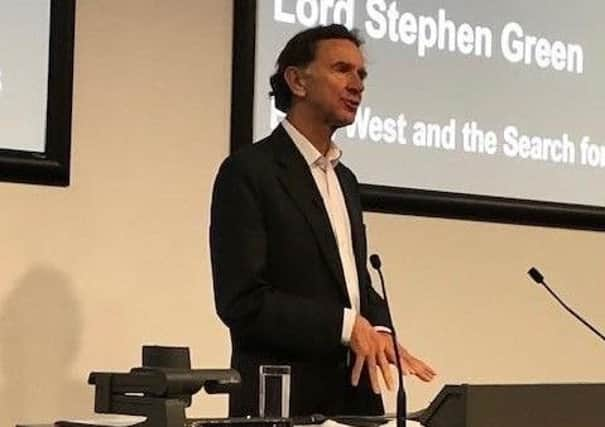Roddy Gow OBE: Effects and the city – society is being changed rapidly by urban individualism


In two talks at the Business School of Strathclyde University and in Edinburgh he led an attentive audience through the themes of his recently published book, The Human Odyssey – East, West and the Search for Universal Values.
Enormously topical as we wrestle with global challenges, not least of which is the vital importance of understanding each other, he highlighted the key issues affecting current and future generations of Scots.
Advertisement
Hide AdAdvertisement
Hide AdThe long human odyssey of self-discovery has now reached a crucial stage – everything we do affects everyone and everything else – and we know it. The next 100 years will bring more change than we can easily imagine, more opportunities for more people to achieve the fulfilment of a good life and more risk of catastrophe and harm to the whole planet than we have ever known before.
All the greatest challenges of the next 100 years will centre on Eurasia – the landmass which includes Europe, Asia and the Middle East and which is the largest and most crowded continent on the planet. We are used to thinking of Europe and Asia as two separate continents but there is no geographical reason for this. Eurasia is a single land mass, and we cannot make sense of its present and future without understanding that its past has been woven together for a long period of time.
It is where all the world’s great living cultures first emerged. It is increasingly closely connected, physically and virtually. China has taken its place on the world stage and, indeed, all the world’s great powers of the 21st century are Eurasian, except one – America. All are inextricably entangled there, including America. Human experience in Eurasia is becoming, for better or worse, more and more intensively shared. Because of its sheer scale and complexity, what happens in Eurasia will affect the whole world.
Most Eurasians now live in cities – by the end of this century, virtually all will do so. Everywhere, our societies are being changed utterly by the transient life of the city. In the midst of the change it is easy to lose sight of just how radical, how fast and how recent this change is. However, the common experience of connected urban life has not produced any emerging sense of common purpose – let alone of shared identity. On the contrary, the cultures of Eurasia – each with its own traditions, histories, memories, beliefs and aspirations – are becoming more, not less, assertive as they jostle together. Throughout much of Eurasia – with only the Europeans as exceptions – the consciousness of nationhood is at least as strong as ever. Digital connectivity, far from making old histories fade and old barriers crumble, seems to nourish these cultural identities as never before.
So a new balance of power – based on the same fundamental principles that determined relations amongst the European powers in the 19th century – is coming into being, only this time on a Eurasian stage. In the 22nd century there may well be other great powers on the world stage: but not yet. The new geopolitical order of this century is a Eurasian one. It is subject to the same sorts of stress as the old Europe was – in particular, one established global power (America) feels challenged by a big new rising power (China). Does this mean that they will inevitably clash? Will the next spiral of history remind us of the terrible 100 years in Europe which finally ended only in 1989?
But if this seems like a familiar pattern of history, something else is occurring which is not. For better or worse, the experience of urban life is changing all those cultures of Eurasia.
Humanity is slowly but surely discovering that the breakdown and disappearance of older pre-urban social structures and the broadening knowledge horizons of city life mean that we are gradually becoming more individual and more plural. There is no possibility of reversing this trend in human experience, because there is no possibility of reversing the trend of urbanisation. No culture, however deeply rooted, will remain immune to this change.
Viewed geopolitically, the main question is whether and how the world views of the two most important and influential powers on the Eurasian stage – China and America (the one fundamentally Confucian, the other essentially individualist) – can be constructively synthesised. At a deeper level, though, the great question is how the irreversible fact of urbanisation will nurture the growth of human individuality in every society, such that the wisdom of others transforms and enriches all those great Eurasian cultures. All the risks and possibilities for our grandchildren depend on how these questions are answered.
Advertisement
Hide AdAdvertisement
Hide AdAs we consider this the Century of Asia and try to figure out how best to engage with it, Lord Green’s observations are helpful and relevant. A former minister of state for trade and investment, he is also, uniquely, an ordained minister in the Anglican Church whose earlier books have included Serving God? Serving Mammon and Good Value: Choosing a Better Life in Business. His messages resonate with those of the Asia Scotland Institute to educate and inspire tomorrow’s leaders in Scotland.
Roddy Gow OBE, chairman and founder, Asia Scotland Institute.